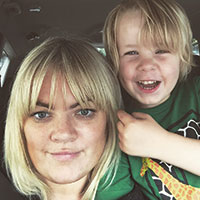The confidence to ask about suicide
 Antonia Hamilton is a call taker with our ParentLine Scotland helpline. On World Suicide Prevention Day, she shares her experiences of ‘suicide first-aid’ training – where suicide can be prevented by addressing it directly.
Antonia Hamilton is a call taker with our ParentLine Scotland helpline. On World Suicide Prevention Day, she shares her experiences of ‘suicide first-aid’ training – where suicide can be prevented by addressing it directly.
I’ve volunteered as a call taker at ParentLine Scotland for over two years now. I love the variety – of people that I speak to in the call room – and the variety of issues I encounter.
Some of the most challenging calls I take involve risk. Often there are risks to the caller because of their mental health, or the child who they’re calling about. While my training and the supervisors prepared me to deal with an element of risk, I was eager to learn more about how to specifically support people who were feeling suicidal or people caring for children who were considering suicide.
The training programme at ParentLine Scotland was one of the most attractive aspects when I was choosing an organisation to volunteer for, and I was delighted to be offered ASIST (first aid for suicide) training. Before the course I felt a little inadequate and underqualified to help some callers who seemed very distressed. But the ASIST training was a huge help in giving me the confidence to give the right support.
The training was an intensive two-day workshop which debunked the common misconceptions about suicide. I was interested to hear that most who consider suicide want to live and suicide can often be prevented by addressing it directly rather than euphemistically.
Having been raised in a traditionally British 'stiff upper lip' family, I’d always believed that to ask someone if they were considering suicide would be at best embarrassing for both of us, and at worst put the idea of suicide into a person's head.
My ASIST trainers explained that if someone is thinking about suicide, those thoughts are already in their head and that it can be very helpful to remove the stigma of suicide by discussing it. I learned the various stages of the ASIST model, including helping the suicidal person to disable their plan and making a contract with them to try to keep them safe in the short term.
During the first few shifts after my training I felt a renewed confidence about supporting callers with mental health issues. Then the day came when I was able to draw on the ASIST model. This caller sounded very distressed and spoke of their depression and feelings of hopelessness.
Previously I may have concentrated on the child that the caller was calling about. This time I could sense that the immediate risk was to the caller, and I was able to ask, after a while, if she was feeling suicidal. In the past I would have worried that this would be awkward and imagined that people would baulk at being asked such a direct question. To my surprise she seemed grateful for my intervention. She reassured me that she wasn't thinking about suicide and wasn’t shocked by my asking. It seemed to spark a connection and a deeper feeling of empathy which helped us to then talk in depth about her feelings.
Since those first calls I’ve had cause to use the ASIST model often. There are parents who are concerned about children who are self-harming or isolating themselves, parents whose children have attempted suicide and callers who are feeling suicidal. I’m much more confident in offering support and advice using the ASIST framework.
Most importantly I no longer shy away from addressing suicide – I have even raised it with friends.
